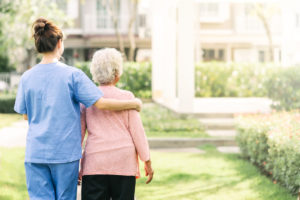
When assisting a claimant who has been injured as a result of nursing home abuse, an experienced personal injury attorney, like those at Dalli & Marino, LLP, will look for a variety of credible witnesses, including eyewitnesses and expert witnesses. Here is a look at these types of witnesses and four ways they’re important to a nursing home case.
1. Eyewitnesses Can Help Explain What Happened to the Resident
There are a number of individuals at a nursing home that may have witnessed the abuse and can provide testimony for the claimant’s attorney, including:
- Other residents who witnessed the attack and are able to clearly articulate how it occurred.
- Nursing home staff who were present when the abuse occurred.
- The claimant’s visitors who noticed signs of abuse or neglect, such as bedsores, physical injuries, or changes in behavior.
- Medical staff responsible for treating the victim’s injuries after the abuse occurred who can speak to the condition of the victim when they arrived at the hospital.
Credibility is important when selecting witnesses to support a nursing home abuse claim. The witness must be able to clearly and consistently recall the event, have the ability to understand questions that are asked to them about the incident, and provide appropriate responses to those questions.
2. Expert Witnesses Can Speak to the Quality of Care Expected of the Facility
Expert witnesses in nursing home cases are those who can speak not only to the severity of the injuries that were sustained as a result of abuse, but also can talk about the actions that a reasonable and well-trained individual working in a nursing home facility would take in order to prevent residents from incurring harm.
The ability to speak about the actions of reasonable professionals at nursing homes is important to the ability to prove liability for the claim, as reasonable or expected actions by the providers of nursing homes are the basis of a standard of care. In order to be liable for the injuries incurred as a result of abuse, the facility must be found to have failed to provide the established standard of care.
3. Witnesses Can Help Establish a Pattern of Negligence
In the criminal court process, which involves arresting and charging a suspect of a crime, and trying them on those charges, the burden on the plaintiff is to prove guilt beyond a reasonable doubt. In a civil matter such as seeking compensation for the expenses of an injury incurred as a result of nursing home abuse, the claimant’s burden is to prove their case by a preponderance of evidence. This means that the injury “more likely than not” occurred in the way that the claimant said it did.
When a nursing home has a pattern of issues, particularly a pattern of residents complaining of or becoming injured as a result of abuse or neglect, this information can also be important when presenting the claim in court. As part of their investigation into the claim, a lawyer will often not only consult the facility’s most recent health and safety inspections to determine if there were past investigations and violations, but will also see how those violations were addressed by the facility. These topics can often be addressed during witness depositions.
4. Expert Witnesses Can Paint a Picture of the Future
The ability to have a successful outcome to a nursing home abuse claim does not simply rely on the ability to prove the abuse occurred, but also to justify the claim’s value. Because New York personal injury claimants can seek compensation for both the financial costs of the injury as well as the psychological ones, establishing a value to the claim is not merely a matter of adding together medical and other out-of-pocket expenses.
An experienced New York nursing home abuse lawyer will consider a number of factors when valuing the claim, including the severity of the claimant’s injury, the amount of insurance the facility has to compensate the claim, and the level of recklessness or malice that led to the abuse. Another important factor is how the injury will likely impact the claimant in the future.
Expert witnesses such as medical professionals, psychologists, and economists can be important in helping a judge or jury to understand the types of costs that will likely arise in the future for the claimant, therefore showing the need for this additional compensation.
For Assistance With Your Nursing Home Abuse Case, Contact Dalli & Marino, LLP
The experienced legal team at Dalli & Marino, LLP has been assisting the injured in New York to get the compensation they need for almost 20 years. While the majority of personal injury claims are resolved by settlement before they ever reach the inside of a courtroom, the Dalli & Marino, LLP team meticulously prepares each claim as if it is going to trial and we may welcome litigation if that is how our client is able to obtain the maximum level of compensation available for their claim.
Let our experienced nursing home abuse lawyer explain the personal injury claims process to you in greater detail, and talk with you about the services we can provide to assist you as you navigate the personal injury claims process. For your free case evaluation, contact us online or by calling (888) 465-8790.


